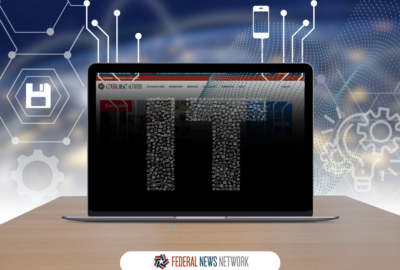Congressman supports federal body to monitor AI, like one for cybersecurity
Some members of Congress want to make sure the government is able to keep tabs on AI developments and react accordingly.
There has been a ton of new developments regarding AI this year. It certainly has the potential to change many aspects of American industry and technology. Some members of Congress want to make sure the government is able to keep tabs on those developments and react accordingly. For more, Federal News Network’s Eric White talked with Rep. Troy Carter (D-La.).
Interview Transcript:
Eric White A ton of new developments regarding AI this year certainly has the potential to change many aspects of American industry and technology. Some members in Congress want to make sure the government is able to keep tabs on those developments and react accordingly. One of them, Louisiana Democrat Troy Carter, who joins me now. Congressman, thank you for taking the time.
Troy Carter Eric, thank you very much, always good to be with you.
Eric White So tell us how this legislation came together, and what would be your main goal?
Troy Carter Well, the legislation is born from the speed at which we we see technology moving. We’re trying to learn from the mistakes that we made with the onset of the internet. AI is a very, very powerful tool, and can be very beneficial in so many ways, but we also know that it can be abused. So, our effort is to make sure we get our arms around it, we extract good and protect our citizens and our country from the nefarious actors who would attempt to do the wrong thing with it. So, this idea of bringing together the players within CISA, Homeland Security, to contemplate, if you will, the issues that are out there and tighten them to make sure that we lessen the effect of those who would have ill thoughts on how to utilize this technology.
Eric White I know it’s still a new technology and there’s a lot we don’t know about what could occur, but what are your main concerns? And, you know, what are those mistakes from the Internet days that you’re worried about us repeating?
Troy Carter Well, in AI, we know that we have image replication where you can have a person, I could have you, Eric, look just like you, saying things that are fundamentally contrary to your beliefs. And the public wouldn’t know. We know that the the stealing of information, the applications as basic as in the classroom, writing a paper for a student, all the way up to our national security and stealing critical information on our military, our placement, our national security, and everything in between. From our financial institutions, to our institutions of higher learning, all are at risk of having not only breaches, because that’s one thing that’s another issue of having sacred data. And important data would be in financial information and personal information, people’s social security numbers, their banking information, their pass codes for their computers and to access other vital information that is private, but also the applications of mimicking people, mimicking ideas. The breadth of knowledge and power that’s behind AI, we’ve only scratched the surface of what it could be. And we’ve got to be very, very, very careful that this does not get out of our hands or out of the barn too fast. And we’ve got to stay up with and ahead of the bad guys. Because while we have this technology, they do too. And that’s the reality. We’ve seen it impact our placement in military regimes. We’ve seen it impact our national elections in, this is one of those cases, as I like to refer to as, common sense legislation. We cannot let this develop without there being some regulation as to the parameters for its use.
Eric White We’re speaking with Louisiana representative Troy Carter. And, so, one of my main questions is, why CISA? What role do you see this AI taskforce playing in formulating federal policy? And what is it about CISA that you think they’d be poised perfectly to do this task?
Troy Carter Well, they’re central intelligence. This is where this is where the databases are. This is the people that are dealing with this more often than not. That doesn’t mean that others will not be tapped. But within Homeland Security and central information intelligence, this is where the data, this is where the technology lives. And these are the people that deal with this, day in, day out, from various formats. So it’s important to have these entities talking, communicating, sharing notes, zeroing in on, while they have so many other responsibilities, the reality and the reasoning behind the taskforce is to kind of force them to the table to have this as a higher priority of review. And then having them report back to the department, the Committee on Homeland Security, which I serve. So in real time, we’re getting this information, and then we’re determining if further legislation is required, if further coordination with other entities or agencies or other committees of the United States Congress are necessary to make sure that the right hand knows what the left hand is doing. And most importantly, the right hand and the left hand join together to protect the integrity of our data in America.
Eric White Yes, so there’s other entities I’d like to ask you about. You know, CISA is taking a bigger hand in working with those critical infrastructure industries. I’m sure you’re aware for shoring up their cyber resiliency. Could you see CISA doing something similar with all these AI companies that seemed to have been popping up in the last couple of months?
Troy Carter Well, absolutely. Because I think ultimately, it’s going to require a broad band of regulation. I think it’s imperative of government to make sure that we have guideposts, that we have guardrails, that we’re able to step in when nefarious actors are coloring outside the lines, to make sure that we have systems in place so we don’t have to go and recreate the wheel, or create a wheel. We’ll have a wheel that’s prepared in place to defend against bad actors. Oftentimes, we find ourselves playing catch up and reacting to things. My idea and notion myself and ranking member Thompson, behind this legislation, is to be proactive. One of the things that we don’t do enough of, we spend a lot of time chasing the issue instead of getting in front of it. And what this task force does is allows us to get in front of it, contemplate issues before they are issues and have resolutions to them before they rear their ugly heads.
Eric White Yeah, I was going to say, you know, it’s well known that Congress seems to sometimes have trouble staying ahead of the game. So it seems as if you are trying to take a different approach and just get out there before problems become problems, even though this is a new technology, and we may not even know what those problems are yet.
Troy Carter That’s exactly right. And that’s the whole idea, contemplated what may come. And listen, we’re not flying completely blind. We’ve seen what’s happened with social media. We know how this thing has bloomed and grown. And for every bit of usefulness that we get from it, there’s a tremendous amount of bad stuff. And how do we sift through the bad to bring the good to light? The utilization of AI is not a bad thing in and of itself. But like many good things, it can be abused. And so we want to put our arms around that and make sure that we limit the abuse and maximize the good use.
Eric White Louisiana Congressman Troy Carter, thank you so much for talking with me.
Troy Carter Always happy to be with you, my friend. Keep doing great work spreading the good news to the American people. We depend on podcasts like yours to highlight and enlighten the people what we’re doing in Washington and how they can partner with us. So, God bless you for for being a great advocate.
Eric White Well, thank you so much for your kind words.
Copyright © 2025 Federal News Network. All rights reserved. This website is not intended for users located within the European Economic Area.
Eric White is news anchor and Federal Drive producer at Federal News Network.
Follow @FEDERALNEWSCAST






